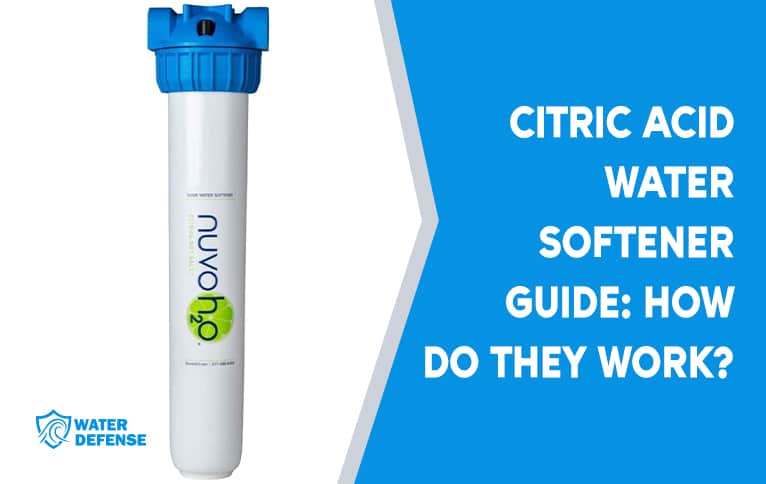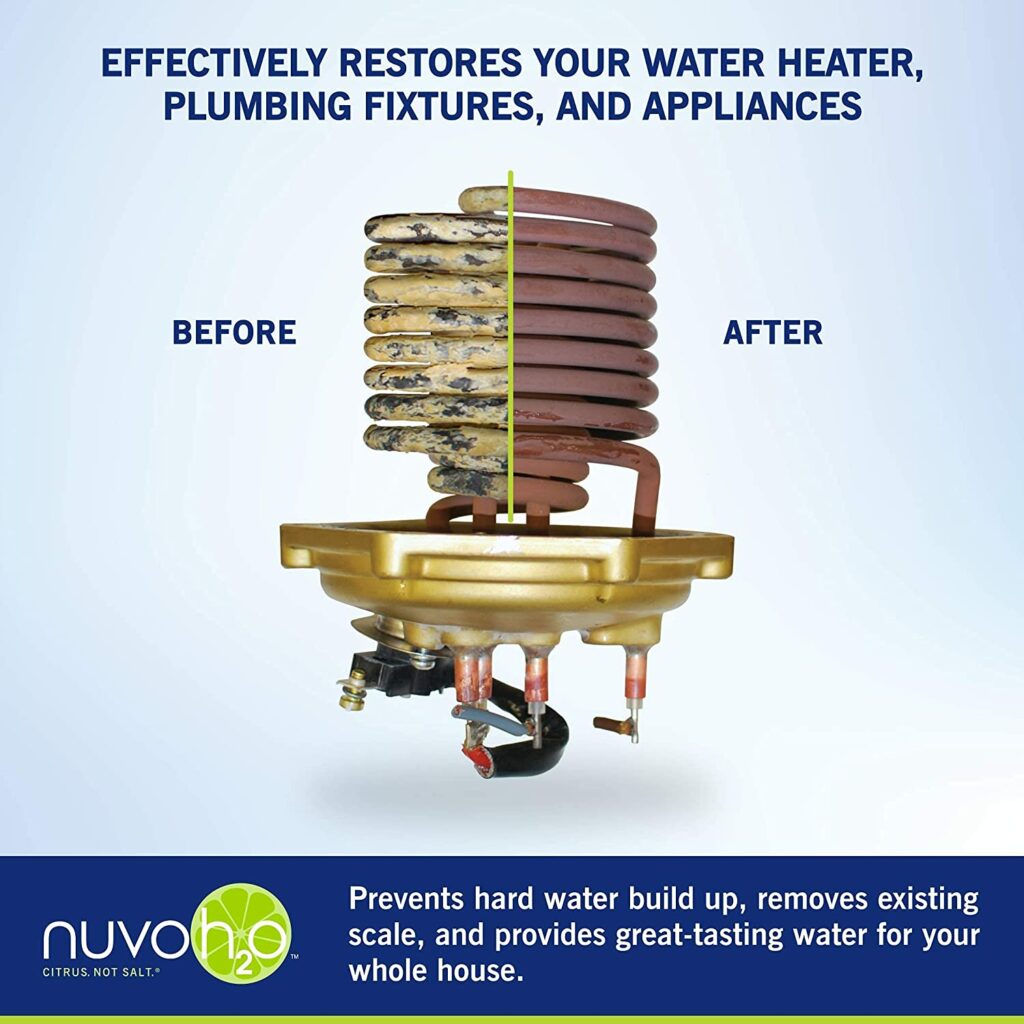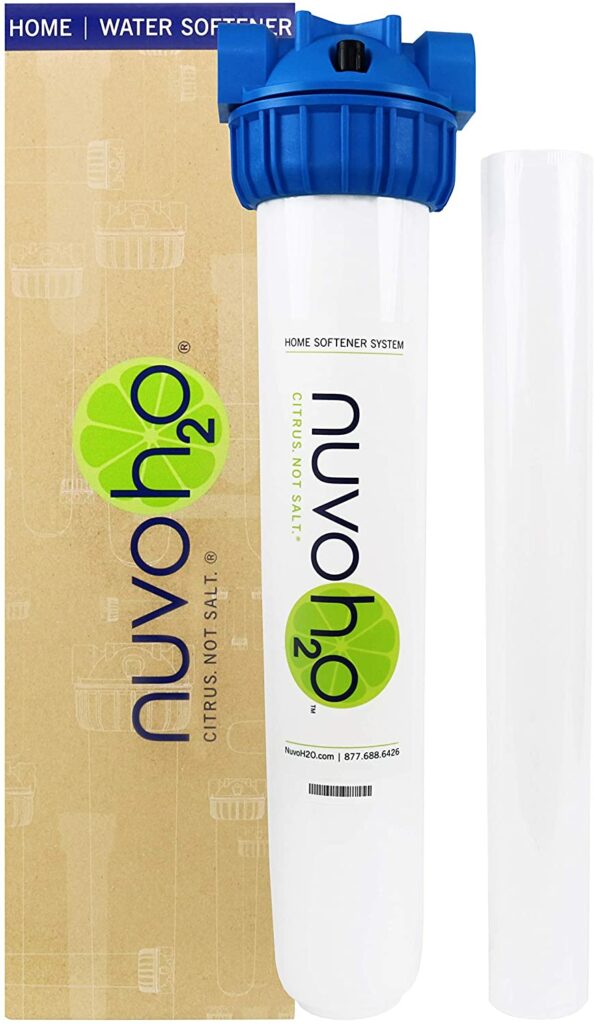Citric acid water softeners are the ideal alternative to traditional salt-based systems. As they don’t use salt, they’re more eco-friendly and far easier to maintain.
Sounds good, right? But how do they actually work to prevent the issues caused by hard water?

In this guide, we’ll explain what citric acid water softeners are, how they work, and why they’re important. We’ll also cover their pros and cons and review the best citric acid water softener brand on the market, NuvoH2O.
What Is a Citric Acid Water Softener?
A citric acid water softener is a salt-free solution for treating hard water. It works by altering the behavior of minerals like calcium and magnesium.

Citric acid water softeners slowly release small amounts of citric acid into your water supply. This binds to the mineral ions responsible for hardness and prevents them from sticking to surfaces, reducing the risk of scale buildups and preventing excessive mineral deposits in your appliances and pipes.
So, how does this differ from traditional softeners? Well, salt-based water softeners rely on salt to treat water systems. These systems often require an electrical supply and a wastewater drain to work properly, resulting in soft water that may taste slightly salty. As citric acid softeners don’t use salt, this isn’t an issue.
Additionally, using a citric acid water softener is effortless and requires little maintenance. After a quick installation, the removable cartridge will slowly add citric acid to your water.
When a citric acid cartridge is depleted, you swap out the easy-to-replace cartridge and continue using your water as normal. Some systems are designed to last six months on one cartridge. Most citric acid water softeners don’t have indicator lights that tell you when the cartridges need to be replaced. So, you should replace the cartridge within the timeframe the manufacturer recommends.
Unlike traditional systems, there’s no need to regularly add salt to a citrus softener.
Why Are They Important?
Hard water is a common issue in the United States, affecting 85% of homes. It can cause a range of problems for your plumbing, dishes, and even skin due to its high mineral content. If this is allowed to persist, the minerals build up in scale deposits.
These deposits can lower your water pressure and leave behind unwanted stains on your laundry and household appliances. They can also cause your appliances to overwork and burn out faster.
Hard water can also have negative health effects. For instance, it can contribute to dry skin and hair and may change your skin’s ability to protect against harmful bacteria and infections by altering its pH balance.
Using a citric acid softener can lead to cleaner pipes, longer-lasting appliances, easy-to-clean surfaces, and healthier skin.
Pros & Cons of Citric Acid Water Conditioner
PROS
- Prevents the formation of scale deposits in pipes and on dishes
- No electricity is required, and no wastewater is produced, making these water conditioners an eco-friendly solution
- The easy-to-replace cartridges simplify maintenance
- No need for bulky bags of salt that add an undesirable taste to your water supply
CONS
- While not required, most people have their water conditioner installed by a professional, which can be quite expensive
- Existing mineral deposits might break up and flush through the system
Does Citric Acid Remove Hard Water Minerals?
Citric acid water conditioners do not remove hard water minerals in the same way that salt-based water softeners do. Instead, by using a process known as chelation, the citric acid binds to the minerals and changes them so they don’t stick to surfaces, appliances, and skin or build up in your pipes.
As citric acid doesn’t actually remove hard water minerals, the term “citric acid water softener” is technically incorrect. Instead, these devices condition water to behave like softened water, and so they’re commonly referred to as “citric acid water conditioners”.
How Much Citric Acid Do You Put in a Water Softener?
A citric acid water softener only requires a small amount of citric acid to function. The cartridge automatically releases citric acid into the system, so you don’t need to manually add it yourself.
The only thing you need to do is to replace the citric acid cartridge. The best systems use a cartridge that lasts six months and is very easy to replace.
There’s no need to call a plumber, buy large bags of salt, or do anything other than swap out the refill cartridges.
Best Citric Acid Water Softener: NuvoH2O Review
The NuvoH2O Home Water Softener System is an ideal solution for homes dealing with hard water issues. It receives rave reviews from people who have installed the system due to its eco-friendly design and easy maintenance.

You can select from many different NuvoH2O citric acid water softener systems. If you have hard water, getting a system that treats the entire water supply is the best route to take.
There are multiple options for this brand of softener, so you can find a model that suits your budget and household needs.
Pricing
The NuvoH2O Home Water Softener system is the cheapest unit, costing $629.99. For larger homes, there’s the Manor Water Softener, priced at $999.99.
NuvoH2O also gives you the option to add taste filters to their products for an extra fee. The Home Duo Water Softener with Taste Filter costs just under $800, while the Manor Duo Water Softener with Taste Filter costs $1499.99.
If you don’t need a whole-house solution, NuvoH2O has more affordable options, like point-of-use systems for your dishwasher and water heater. The Nuvo Dishwasher System costs $139.99, while the Water Heater System costs $99.99.
Installing a household system usually takes less than an hour with a qualified plumber. This means installation is fairly cheap compared to other systems that require electricity and wastewater drainage.
To get a precise idea of how much it costs to install a NuvoH2O water softener, head over to the NuvoH2O Installer Locator website and call one of the recommended installers.
Maintenance & Use
In terms of maintenance, all you need to do is replace the cartridges. As long as they’re the appropriate size for the household, these cartridges last approximately six months in the system. However, depending on your home’s water usage, they may last longer or shorter.
NuvoH2O’s systems can be used with both city and well water. However, if your well water tastes bad, a citric acid softener will not address this unless you opt for an additional taste filter.
Nuvoh2o unit: does the water test hard or soft when using using a hardness test kit (yes or no).
Hi Jerry, the hardness is not removed with the process that the Nuvo product uses. So, it will test hard.